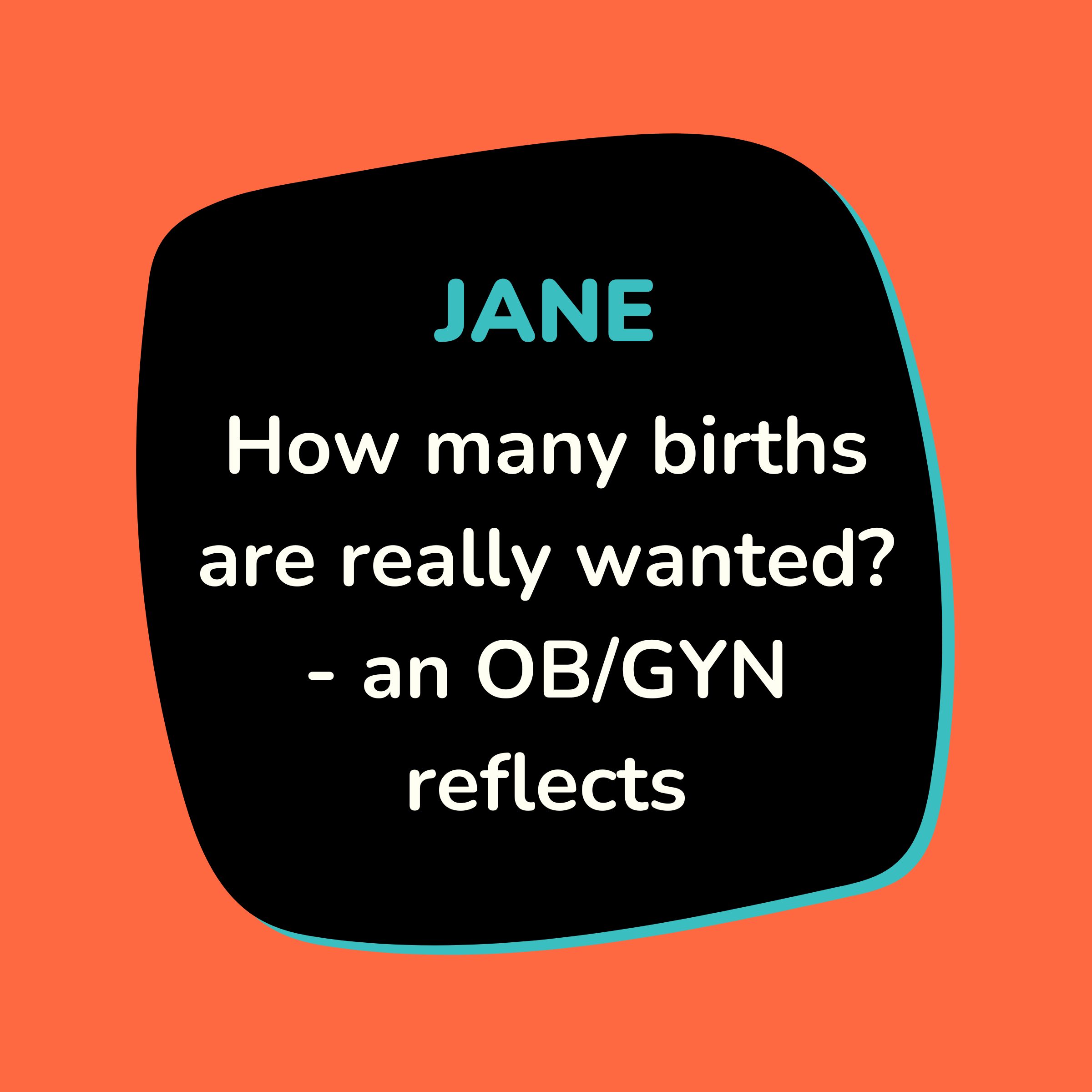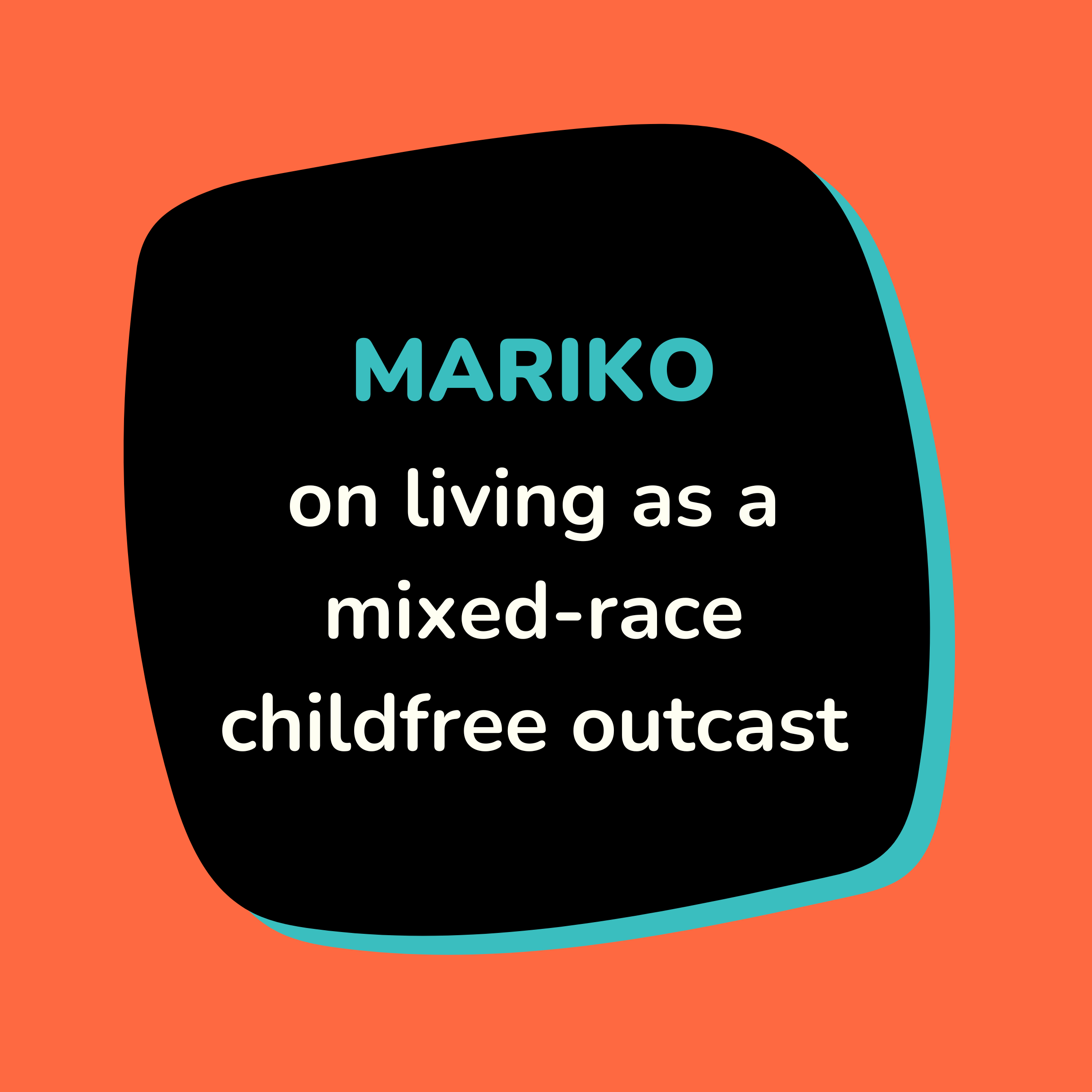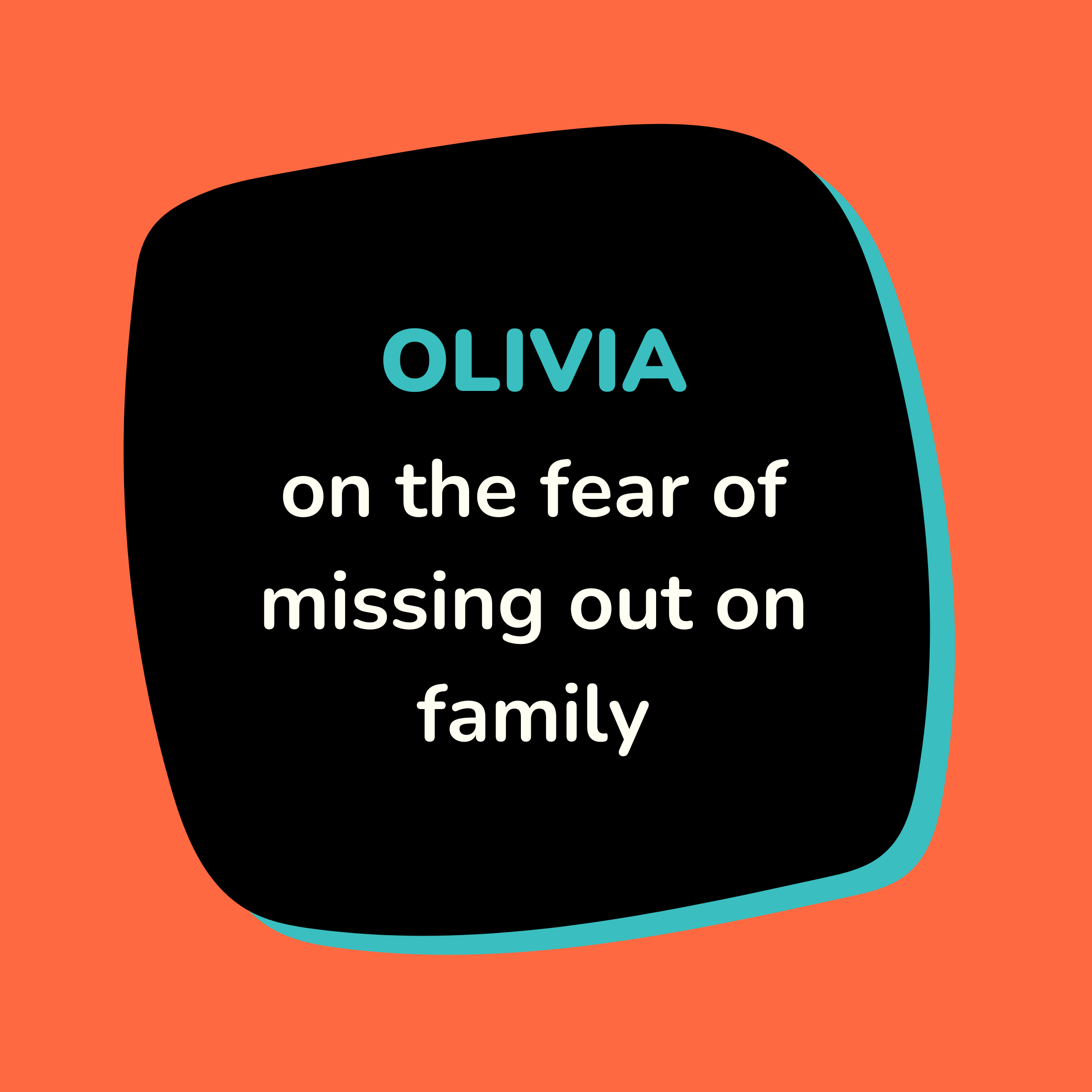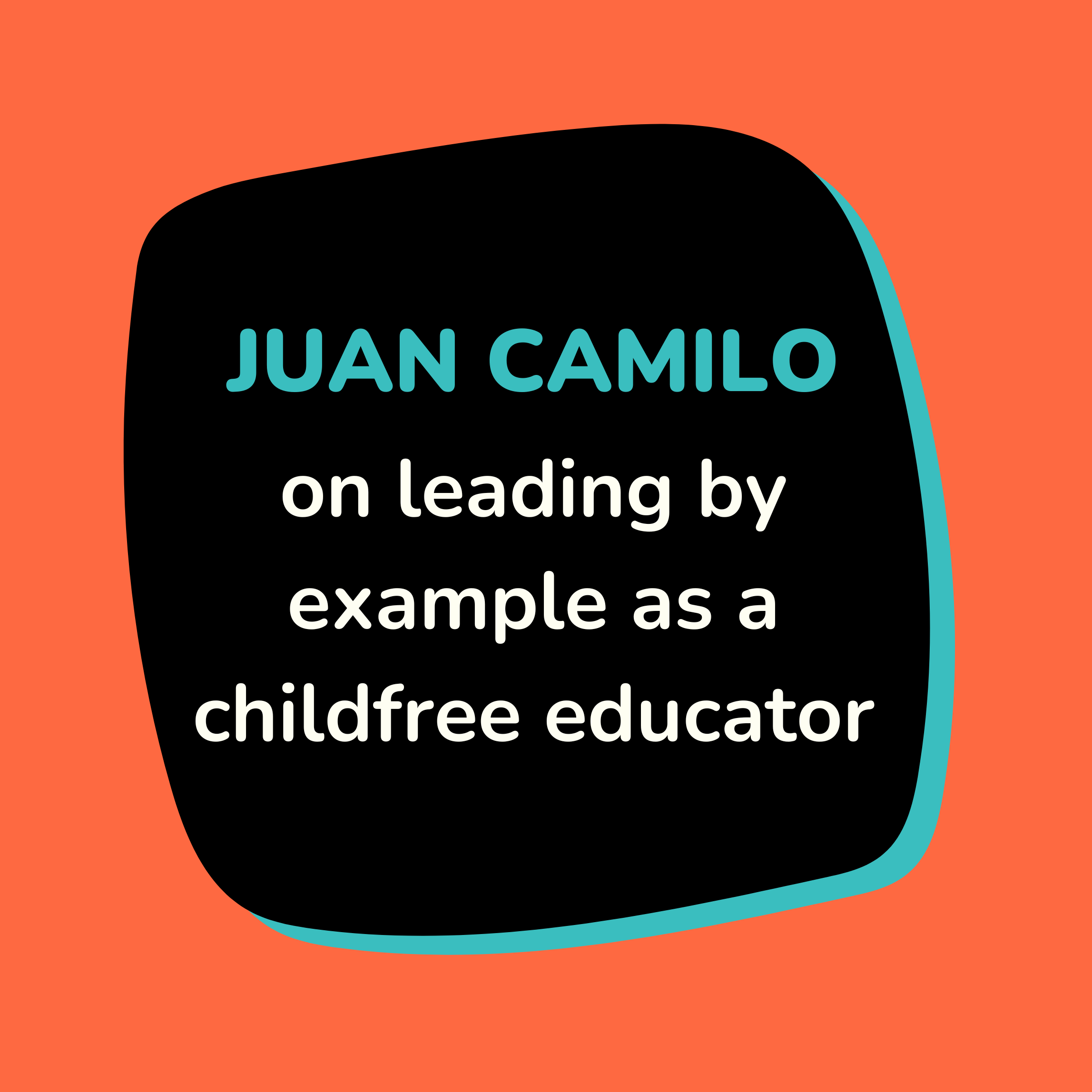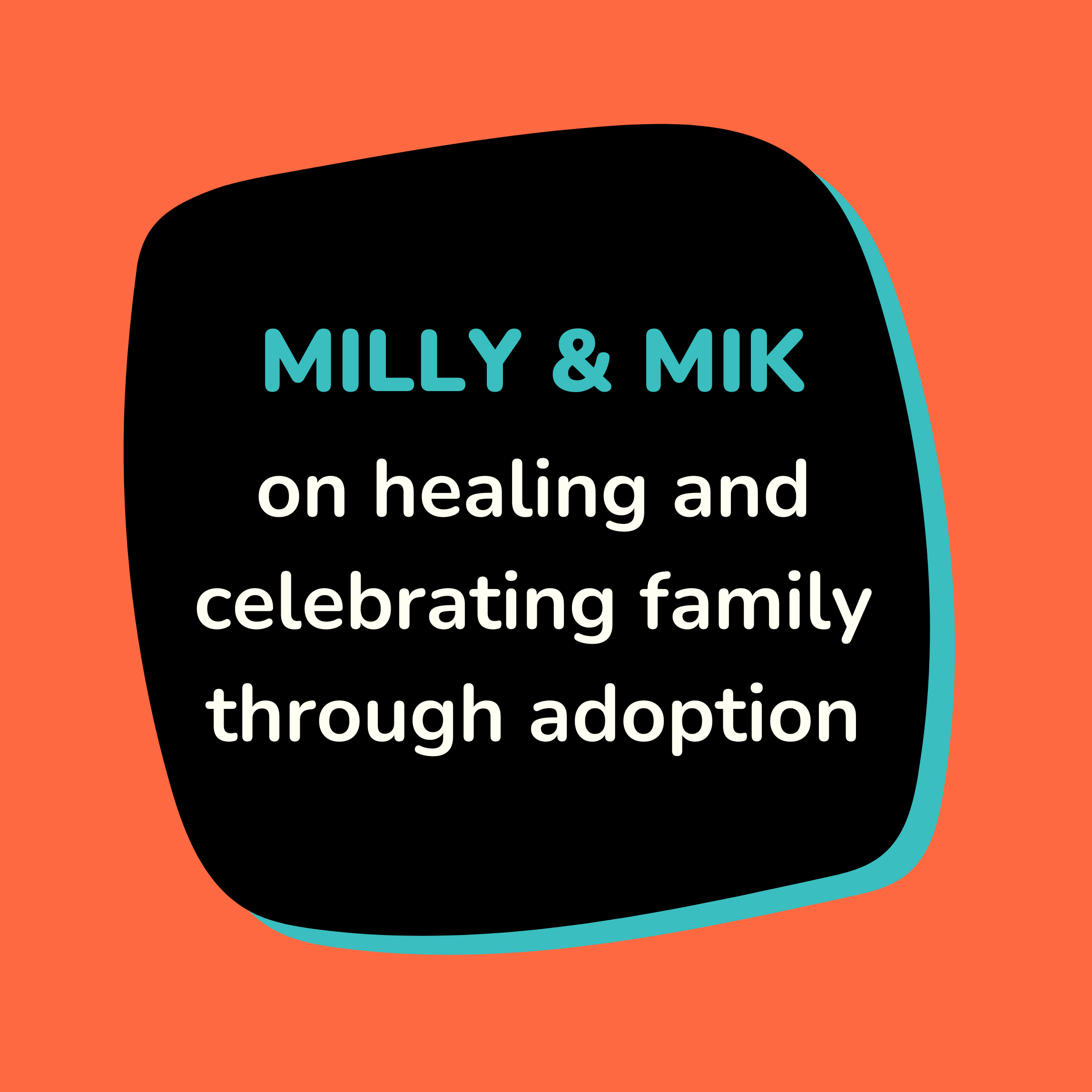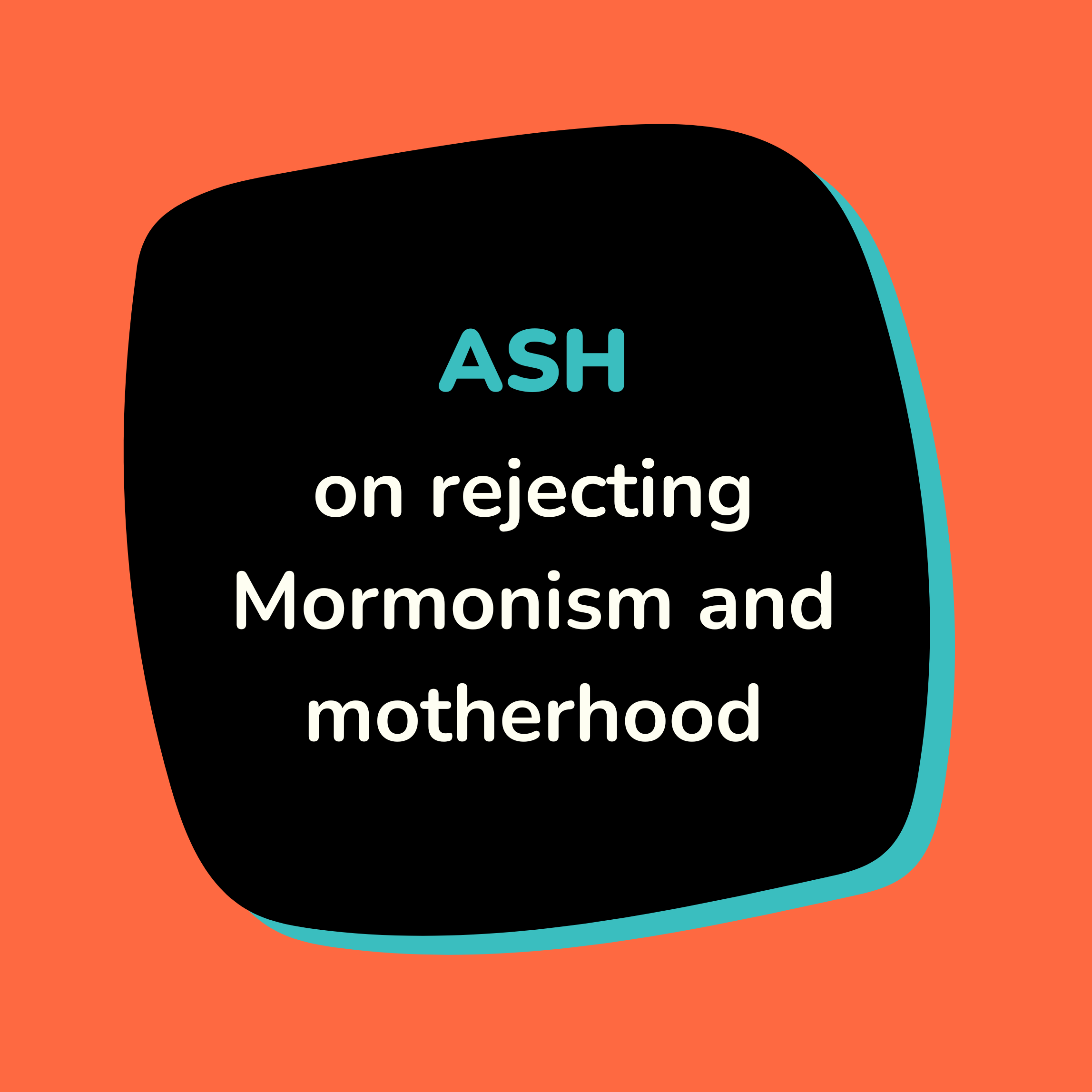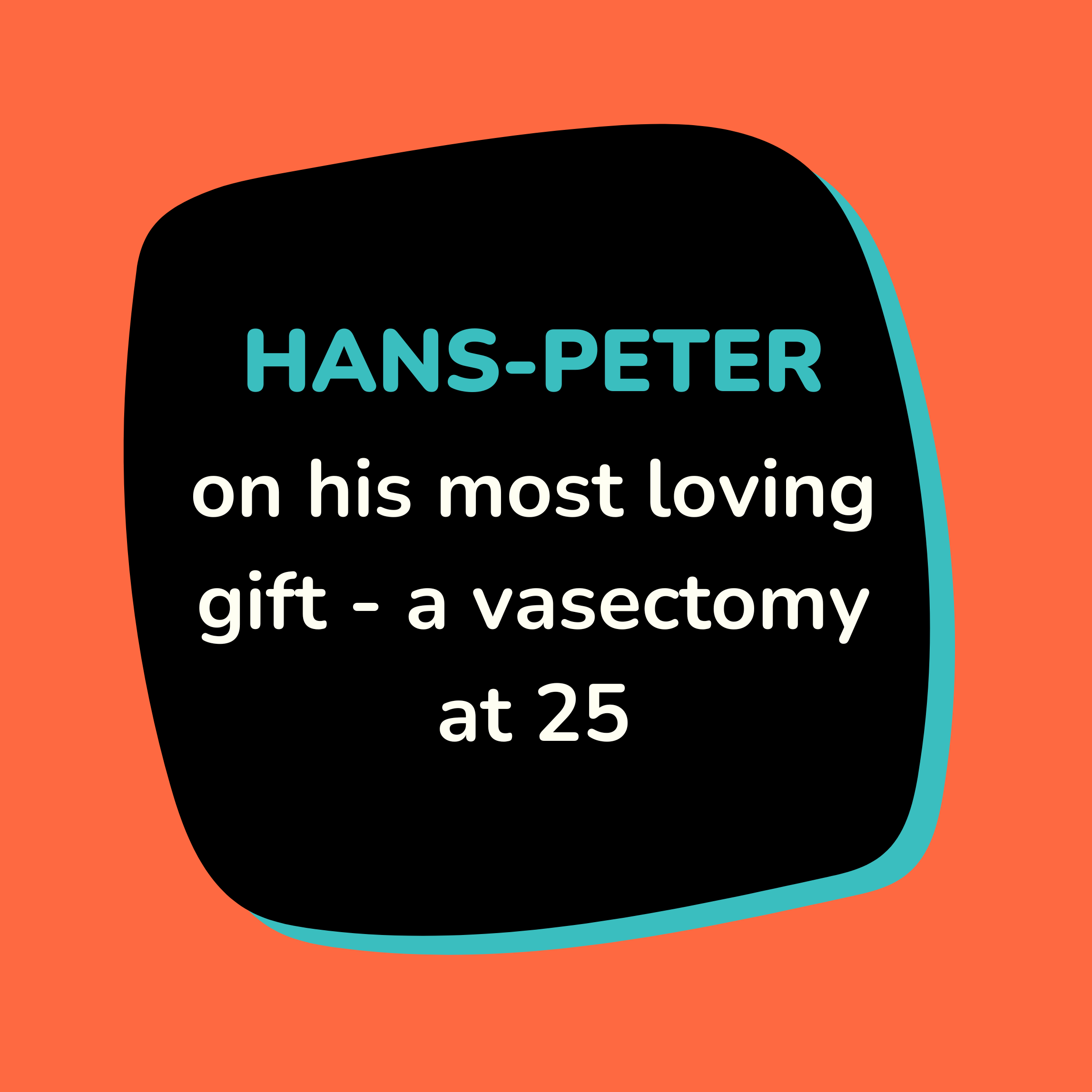Laura - on escaping the Trad Wife culture of the U.S. South
Raised in the conservative Deep South of the United States, Laura always believed having kids was a requirement. When she found out it was optional, suddenly everything changed.
-
Laura 0:00
I had some really wild lessons about sex or lack thereof, in regards to it being something that's totally detrimental and you should never do it. But once you're married, you're allowed to do it, but you're really just doing it for your husband, because otherwise you should be ashamed of yourself. Getting the message from the get-go that my job here is to have children, and adults won't really tell me what sex is, and they're trying to keep me from having it - all of that was in my head all the time, like a little rain cloud that followed me, and it all seemed so unnecessary. Like I wonder what life would have been like if people had just ignored the fact that I'm female, and were like, Hey, what are you good at?What do you like doing? What would you like your life to be?
Nandita Bajaj 0:52
That was today's guest, Laura. Hello everyone, and thank you for joining me on this journey. My name is Nandita Bajaj, and I'm the host of Beyond Pronatalism: Finding Fulfillment, With or Without Kids, an interview series in which, through intimate conversations with women and men from diverse backgrounds, I explore how they are courageously and creatively navigating pronatalism - the often unspoken pressures to have children, whether from family, friends, or the culture at large. In each episode, I dive into personal stories with people who are forging unconventional pathways to fulfillment, including redefining what family means to them, whether that means being childfree or childless, having biological kids, adopting or fostering children or animals, or creating close-knit communities of friends and loved ones. Hi, Laura, welcome to the podcast. It's lovely to have you.
Laura 1:52
Hi, Nandita, thanks for having me.
Nandita Bajaj 1:54
And we can begin by diving right into your background. Could you start by talking a little bit about your upbringing, and just share with listeners a little bit about yourself?
Laura 2:07
I am from and still live in South Carolina, which is a geographically wonderful place to grow up. It's very traditional. It's very southern and old-fashioned, and most people here are Christian - Protestant, Catholic, that kind of a thing. But I come from a very happy family. My parents are my best friends. I have an older sister, and it was a really, a very cheerful, happy place to be a kid. And I had a lot of fun as a child. And over time, I've learned a lot of things and changed a lot of the opinions that I was given when I was a kid. And so now I work for a nonprofit educating people about the food system, which is my passion, is to let people know what their choices are doing down the line for people and the environment and animals. And it's been just the most fun, kind of awakening to realize the systems that we live in, and then get to work to try to make positive changes within them for everybody, including my beloved neighbors.
Nandita Bajaj 3:15
Thank you for sharing that. And what was the general climate like growing up when it comes to pronatalism, kind of within that American South region where you are?
Laura 3:27
It's like all the highlights that people throw out there when they talk about what matters in life and what women should be doing. So this is a place where women work in the home and men work outside of the home. Children are a blessing from God and a miracle. And as a girl in the South, like right away, you're supposed to be polite, be a lady, you know, don't wear short dresses or low cut tops,and be mindful of how you appear. Like kind of this immediate, from the time you're a little kid, you know, they hand you a baby doll and say, be nice to everybody and don't cause a scene. And for the boys, you know, it's put on a tie on Sundays, but, you know, they're supposed to be a man. It's a lot of hunting here and eating steaks and smoking cigars on the porch. And it's like the South could be like a cartoon stereotype for gender roles, but as a kid, you know, I really took that to heart, because I didn't want to upset anybody. I'm a very gentle person, and I was a very gentle kid, and so if I knew that I was going to cause harm or upset anybody or get in trouble, that would really affect me. And so I was a very quiet and a very polite little girl, and I did what I was told, and I never caused a problem, which, you know, outwardly, I guess people loved, but inner just utter turmoil of like, oh, man, none of this feels good. What about what I need, or how I'm feeling, and that sort of a thing. But my mom is, like, the main southern culprit. Her family's been here a very long time, and they talk very gently, and don't cause any trouble now Laura, that kind of thing. And she has some sisters, and she was always very concerned that anything that my sister or I would do would upset grandma. It was like, Don't upset grandma. Meanwhile, my dad's family is Lebanese, and while they're very much southern, and they're from here, they're much more Middle Eastern, like they're boisterous and noisy and they ask for what they want, and I always found them so inspiring, compared to, like, my mom's family, which would dissolve into dust the moment something bad happened, whereas my dad's family would like come at it. And I don't know why I didn't get more of my dad's 'kick down the door and just say what you're feeling', but I didn't.
Nandita Bajaj 5:41
And when you speak about the inward turmoil, what was it that was going through your mind about things not lining up?
Laura 5:50
There was so much of being a kid where you just don't have autonomy. It's always like, eat this, wear this, go here, hug your uncle, drink your milk, go to bed, go to school, do your homework. And while I understood why they wanted me to do those things, there were still things that I needed, like time by myself, or time outside, or time to be creative. Those needs weren't being met. And so you just kind of become this little shell of a person who's like trying not to cause any trouble, but is feeling very either overlooked or under-satiated in some other way. And I think back on that now as an adult, and realize that that's part of why, when I think about having kids, I think about creating a little person who's going to be forced through a system despite what they need or feel that day. The system we have in place just does not work for so many kids, and I was one of them. I hated school. It felt so wrong. I didn't learn best in an environment where there were a lot of other people and a lot of stimulus. And it's like, how do you navigate helping a child versus also making it hit the checkpoints that it needs to hit, so that it can be a functioning member of society. And that's something I think about a lot, especially now, in retrospect, I realize that that's what was bothering me a lot of the time, was the lack of autonomy. You know that carries on like until your 20s, until you go to college, and you're finally, like, set free to decide what you want your life to be like. But up until that point, it's like, your skirt's too short, you know, put those shoes on, where's your coat, wear this, you need to be here, meet me here. And it's like, oh, man, guys, like, none of this matters to me. Why do I have to do it? I want to drink tea and read a book.
Nandita Bajaj 7:33
Yes. And I'm sure so many people can relate to that feeling of being so restricted and feeling prohibited from really expressing creativity and being able to just try things out and make mistakes. So what were the ideas, cultural ideas, or expectations around having kids, creating a family and kind of being a traditional wife and a mother. What were they like? How did they show up in your life?
Laura 8:05
Those were the expectations. So I didn't have adults tell me that I couldn't be anything. You know, I wanted to be a veterinarian at some point, and they said, go be a veterinarian. But there was always the underlying thing of, You'll do that until you have kids, more or less, and then you'll be a stay-at- home mom, which is what my mom, more or less, was, and that was very normal. I feel like, growing up,there were a lot of kids' mothers who worked, but the other mothers would kind of side-eye them, like, why are they going to work? Their job is to be home with the kids. So the expectation was, you know, at some point I would get married and have children and run a home. And they start preparing you for that right away by cramming a baby doll into your hands when you're like three, and talk about when you have your kids someday. And so whatever I dreamt up for myself, there was always an adult adding in the bit where I have kids and, you know, get married and run a home and be a traditional wife that makes dinner for the husband when he comes home from work. And I was very suspicious of it from the get-go, partially because, like, I didn't want to play with the baby doll. I was very interested in the stuffed animals. I would coddle them all day, but the baby doll is kind of like, it'll be fine. And getting that message over and over again, or when you have kids. People were talking about my children as if they already existed, and constantly getting that message from the time that I'm little all the way through middle school through high school. And it's sort of like, Why is everyone so obsessed with this? Because it didn't appeal to me. Other children brought about feelings for me that I didn't enjoy. Like I feel like I could feel their feelings, and I always was trying to get away from them so that I wouldn't feel their feelings, like they were upset I was upset. And even as a teenager, I had people tell me like, oh, it'd be such a waste if you didn't have kids, or, Oh, your life would be sad if you don't have kids. Because I I knew early on that I didn't want them, so I was always playing that tune, and no one ever had a positive reaction to it. Mostly they told me I would change my mind and like, what would you do if you don't have kids? You're a woman, that's what you're here for. That one always made me angry, but in smaller ways, like I love to cut the grass. It's very satisfying. And if I had a nickel for every time an old man would stop his car and ask me why I'm doing that. And it's usually like, don't you have a husband that can do that for you? And that's usually that. And they laugh and they smile when they say it. It's like they don't know that they're saying something crummy, but it's like they have to comment on the fact that it's odd that I'm mowing the lawn. And it's always an old guy. Women don't care if I mow the lawn. They're like, Oh, she's getting work done, you know. But men are just flabbergasted. I once had a man watch me mow the lawn, and he was just tickled silly. He called his buddies over, and they they watched. And I was kind of scared. I was like, What do you guys, it's like a lady with a lawn mower. What year is it? It's things like that, where if men are just flabbergasted to see a woman mowing the lawn, your society is a little behind the times, and I don't know if they're being chivalrous or misogynist. I can't tell. It's just wild how often the gender roles and the expectations because I'm a woman, because I'm a little girl, oh, you must be excited to have a pretty kitchen one day, and it's like, oh, there's so much more to life. And let me do these other things at least first and then decide if I want kids. But no, they've decided for me, this is what I'm gonna do, and it's exhausting.
Nandita Bajaj 11:35
You also mentioned, you know, a big part of that kind of responses you were getting was determined more by the cultural climate within that American South. What role do you think religion played into these kinds of messages that you were receiving?
Laura 11:54
I feel like that's the basis of a lot of why the traditions have stayed here because of the Bible says this. And there's so many things in the Bible, you know, like women need to submit to their husbands, which kind of goes against what I feel like Jesus would have said. So I feel like the humans added that bit. But it's like there's a lot of things like that. Having children is a blessing to your husband, or something.The Bible has so many gender things in there. If you want to translate them, they can be very misogynist. And so all the ladies in church have on this exterior of being just genteel southern women, and whatever my husband says, that's what we'll do. You know, I just don't want him to be upset. And those are the women that I'm seeing every week. That's who I know to emulate. Okay, well, these are the ladies that my mom says are nice women, and they're deferring to their husbands, and they're having a ton of kids. So there's like the people in church anyways, and the men were the leaders, and they're all puffed up, because what could go wrong for them in a Christian environment? But then there's like the teachers in the church. And I don't know how they chose the teachers, but I had some really wild lessons about sex or lack thereof, in regards to being something that's totally detrimental and you should never do it. But once you're married, you're allowed to do it, but you're really just doing it for your husband, because otherwise you should be ashamed of yourself. And I wasn't really interested in it at the time, but it still seemed like a bad way to teach people about something that clearly can't be that bad if we have an overpopulation problem. Like I don't think people are hating this as much as the church ladies wanted me to think that they are. But getting the message from the get-go that my job here is to have children, and adults won't really tell me what sex is, and they're trying to keep me from having it - all of that was in my head all the time, like a little rain cloud that followed me from the time I was small to the time I actually figured out what sex was, to the time that I knew for sure that I wasn't going to have kids. And it all seemed so unnecessary, like I wonder what life would have been like, if people had just ignored the fact that I'm female, and were like, Hey, what are you good at? What do you like doing? What would you like your life to be? I feel like I was so focused on this in a way that the other kids around me didn't seem burdened by it, and I was just horrified. I was very scared as a kid, did not want to physically have a child. I was just really afraid. I'm very squeamish. It all grosses me out. And I was like, Oh no, I can't believe I have to do this. I was 11 when I found out that I didn't have to do it. I thought it just happened to you at some point, like you'd just be walking along. And I was so relieved. That's a little kid, and I was carrying this fear and this sadness around the fact that I have to have kids. And the relief I felt when I was 11 is something I can still summon. It was so monumental to me at the time. It was an English teacher, and we must have been talking about it, and I was saying something along the lines of, like, I really don't want to have kids. And she was like, Well, you don't have to. And I was like, what? And she says, Yeah, some people just don't have kids. And I blacked out after that, like, I went into my head with, like, you know, rainbows and sparkles. And it was like, Oh my gosh, I don't have to do this, this thing I've been dreading for 11 years. And that was the moment I was like, Okay, well, then I'm not doing it. Once I got that information, I like, dissolved, and I was like, Oh my gosh, my life can be so different than the one they're preparing me for. And so kind of, from that point on, I checked out of the conversations where they were like, Oh, you're gonna have kids, or sex is sad, or whatever, I was just like, none of this applies to me. I'm not doing it.
Nandita Bajaj 15:40
And so you kind of made the connection that sex is a prerequisite to having babies, and because you didn't have to have children, you were never even gonna have sex, because there was no separation from the act of having sex and becoming pregnant.
Laura 15:56
I was so delighted that I was never gonna have to have sex. And I remember telling somebody that in high school, I think I was like, 14, some boy, and I was like, I'm never having sex. I remember he said, What a waste, which made me very sad in the moment, but I would figure that out later, when I was actually interested in sex, of like, why he was so appalled. And it's interesting that I didn't draw that conclusion sooner, because I have an aunt that didn't have children, but the messaging there was always that she tried and she couldn't, and it was like, Oh, poor her. And I also feel like my mom, who's lovely, I don't know if I just never asked her, but I'm like, Why didn't my mom tell me that I didn't have to have kids? But it's like, I had to hear it from somebody who felt like an authority for me to be like, okay, yeah, I really don't have to do this. One of my Lebanese uncles, when I was 24 he asked me why I wasn't married. I should have two kids by now. And I was like, Oh, I'm not doing any of that. And he was like, What do you mean? I was like, I'm not having kids. And he actually, like, banged his fists on the table. And he was like, Are you kidding? That's like, what you're here for. And he was genuinely angry. Even recently, one of my husband's friends we were visiting, he lives in Mississippi, which is probably more traditional than South Carolina. So he asked, you know, when are we having kids? And we said we weren't. And, you know, he said, why? And I said, Oh, I don't want to do that. And very genuinely with, you know, curiosity, he says I thought all women wanted kids, and this guy is 36 years old. And I said, no, that's just marketing. I don't think he really knew what I meant, but it's wild that the messaging just permeates so many aspects of life, men and women. You know from the time you're small, here's how it's going to be, and if you don't go with that, people look at you strange.
Nandita Bajaj 17:42
And has there been any backlash from family, like direct family, from your parents?
Laura 17:47
I think because one of the tenants of the South is to be very polite, people don't give me a hard time. People are very rarely angry. I think that's why my uncle really stood out to me. But they're usually confused or sad. Those are the two kind of main things, of like, Oh, you're not gonna do that. Why? Why wouldn't you do that? What else is there? you know. And my mom initially was very distraught about it, you know, it was like, Oh, no, I mean, you're not gonna be happy. All these concerns she had. But actually, as time has passed, and she's kind of clocked in to what's going on in the world, and she's watched my sister have children, she has pulled me aside and said, I'm honestly so glad that you're not having kids. Not only would it stress me out, but I'm worried about the world that they're gonna be living in, which is a huge thing for my mom to kind of come around and realize. And the more she and I have had talks about it, she's sort of come around too to realize that she didn't particularly want kids.I don't think she felt strongly one way or the other, but she just assumed she would have them, and so she did. And of course, she loves us, but she does not like other people's kids, and she doesn't really want to hang out with them. And I guess, because she's had kids, she's allowed to be that way. But like when I met my husband, right, like first date, I said, By the way, I don't want kids. I was like, I'm not about to fall in love with somebody who's gonna ruin this for me. And even he didn't feel strongly one way or the other, but he assumed he would have kids. He just assumed it would happen. He assumed he would marry a woman that wanted them. And so when I actually brought it up that it was an option he had never considered his life without kids, and very easily, he was like, oh, okay, let's just not do that then. And throughout dating, as we got more involved with each other, I kept checking. I was like, by the way, I still don't want kids. Do you still feel okay about this? And then, like, a year later, I'd be like, we should get married, but I don't want kids. And kind of kept checking in and checking in untilI really felt like it was something he believed in and wasn't just going along with for my sake. And over time, he's liberated by it. He's like, we can travel, I can get a remote job, we can live anywhere. You know, he's like dreaming big, which seems to be the thing is, like, once you're released from the idea that you have to live in a house that you buy and have kids, the whole world opens up to you. You can go anywhere, you can be anything, you can do whatever you want. And it's crazy that we all dream that, and it stays a dream because we know we can't really do that if we follow society's path for us. And it's like, oh, well, then just don't. But then if you don't, people are very confused,
Nandita Bajaj 20:23
Totally, and yeah, well captured. For a lot of people, it just stays a dream, because from a young age, on the one hand, we are being told to dream big, and you can be anything you want to be. You can follow your passion, but really what your passion should be, what really will bring you joy and happiness is this, this, and this. And if you don't do it, I'll remind you that it's not a good path for you. And I also wanted to comment on the remarkable realization that your mom had about why it's a good thing for you to have not had children, and coming from the perspective of her care and concern for those potential children, that's huge.
Laura 21:07
It is really big. My sister has two children under four right now, and they're precious, of course, but they stress my mom out to no end, partially because she has a way of looking at how kids should be raised. My sister is doing it differently, and so my mom's very worried. I think that's something that happens with every generation of kids. Grandparents are like, that's not how you do it. But she's also watching the news, and she's looking at, we're losing resources and we're losing the rainforest, and food is making everybody sick, and cell phones are depressing teens. You know, I'm like, so thrilled that she's, like, clocking into this, and she says all the time, she says, I'm just very worried. I don't know what their life is going to be like, and we don't have any control over that. And then so, you know, she's like, I'm so glad you're not giving me any extras to worry about. But also her realization that she doesn't particularly enjoy spending time with kids. That's always been something I've said that she didn't like, and now she's like, I kind of get it. This is exhausting. It's because I'm older, you know, I just don't have the energy that I used to. And I'm like, No, it's because it's difficult. And people don't tell you that it's difficult. They do, actually, if you're really listening, people tell you everything you need to know about having kids, but when you ask them, they say all the flowery, miraculous things. It's the minor ways people complain about their kids, like my kid's being a jerk this week. Oh, if we could just get a few minutes to ourselves, or I'm so tired, I wish they would go somewhere else. It's like people are always like dreaming about getting away from their kids, even for a short while. I totally believe that they love their children, but it's clearly exhausting. And my sister is a great example of this, because she'll call me and be like, What are you doing? And it'll be 10 in the morning, and I'll be like, Oh, I'm reading a book on the porch with my tea, and she just gets mad at me. She's like, Oh, you don't know what life is like. And I'm like, Well, I was listening as a kid, and you know, this was a big part of it. I was watching my mom as a kid, and everything she did was such a bummer. She had to get up at five with us to get us ready for school, she had to make us breakfast, she had to pack our lunch, she had to drive us to school. When we came home from school, I was always in a bad mood, and she would have to try to, like, entertain me and make me happy again. And I was watching all of this happen, and I was like, oh,man, I don't think I want my mom's life. And then also, my teachers were stressed out. They're angry. Kids are giving them trouble. This doesn't seem to be this wonderful thing, but of course, when you ask people, oh, it's a blessing, it's a miracle. Children are a gift. And I wholeheartedly believe people. I think children are precious. To me they are so precious that I can't watch this happen, because it's gonna hurt.
Nandita Bajaj 23:46
Totally, and given where you've arrived today in terms of the arc of your life, how do you feel about your life choices, and how do you spend your time and like, what brings you fulfillment and meaning and joy?
Laura 24:00
Thrilled with my choice. A lot of my friends have kids, and they love their children, but the lives they're living right now just does not appeal to me a lot of the time. It really bums me out, to be honest, but that's because I have so many other things I would rather be doing that mean a lot to me. Sometimes when I think about what keeps me going, this is not a nice answer, but I think it's a little bit of bitterness and spite, because the messaging for so long is this one thing, and when you decide that you're not going to do that, every time I hear it, I feel like I have to get involved, which completely contradicts the 'be polite and don't cause a scene'. I really enjoy disrupting the narrative when I can. And I'm at the age now that instead of people asking me when I'll have kids, they ask, like, if I have kids, or how many kids do I have? And if I say I don't have any, it usually kind of shuts them down because they think something has gone wrong, like, she can't have kids, and then they regret asking. And so it's like the conversations are so much shorter now, because I'm old enough to have an eight year old. Why don't I have an eight year old, you know? But there was a period when people would be like, are you having kids? I would say, No, I don't believe in it. They would just be flabbergasted, you know. And generally, they wouldn't ask me more. It would kind of scare them. Like, if you want to talk to me about it, I love to talk about it. I want to hear the conversation. And if you want to pass judgment on me after you've spoken to me and gotten to know that I'm a very kind person that does think children are precious, fine. So in a lot of ways, it's a little bit of spite to, like, find those moments where I can kind of push the needle a little. So anyways, I love being a person that doesn't have children, who can challenge people to think about it. So it's like, I finally found my purpose at 30, which is around the time I found out about pronatalism and all of it. It's difficult messaging, because a lot of times it's like, oh, you're selfish if you don't have kids, you know, they tell you that all the time. I actually think it's the opposite, but whatever. But in turn, I do get to be selfish and say, you know, what's gonna make me happy is spending a day with my husband and taking the dog somewhere. We Have an ever-growing collection of animals who bring us so much joy, and I really feel fulfilled being able to provide for those animals and give them hope. They're like all strays that have like wandered up. The word has gotten out. And I get to spend my time helping people who are already here, which really means a lot to me as somebody that didn't particularly enjoy being a young person. In addition to knowing very early on that I didn't want to be a mom, there was the tumultuous teen years where they're trying to prepare you for a career or like a life path, and it just did not appeal to me. And the idea of spending my time every day doing the exact same thing for a paycheck just didn't work for me,which was very problematic, I mean, realistically, because I'm not asking to be lazy. I didn't not have kids so that I could watch TV all day. I need to do something. I want to do something, but the idea thatI have to do a particular thing in order to be accepted as a productive member of society has always just made me so angry because I didn't ask to be here. And that's something that I've consistently felt when I've gotten frustrated with things, is like, Why do I have to be any certain way or spend my time in the system that you've created when it doesn't feel good to me and I don't want to participate? And this is a tricky thing to talk about, because people will just automatically assume that, like, I don't want to have kids and I don't want to work, what do you want? I want the ultimate luxury of freedom to choose what feels good for me, because growing up, nobody else chose that for me. I didn't get to decide. And so I think eventually that would manifest in me finding something like what I have found, where I really believe in educating people on how systems work, and that's what I want to do. But up until that point, was like, how am I supposed to fill all of these years, if it just brings me to like a depressed place where I'm not happy, I'm not fulfilled, I'm just doing this for money, and I don't even want to spend money on anything, because consumerist culture bums me out. And so it's like, what would I do with the money? And it's frustrating, because as a woman, you either need to be a mother or you need to be a prolific business person, and if you're not one of those two things, what have you been doing? And it's like, what if you're perfectly content running a bakery and just enjoying your weekends and reading books, and the day that that is acceptable I will feel like we have won.
Nandita Bajaj 28:36
I love that so much because it's like an inkling that you had that's probably more our natural state. It's not that life without all of this capitalist productivity is going to be easy, or that this notion of absolute freedom is going to come without any hardships, but I think what you're pointing to is like almost all of us who are caught up in the modern kind of techno-industrial way of being are trapped in a system. We're not free. We are told constantly to find freedom within that system. The freedom is defined by that system. Wellness is defined by that system. And what you're pointing to is just taking a stand against all of that and just removing the word productivity out of it, removing the word lazy out of it, because lazy is built within a system of productivity, right? It's such a paradigm-shifting way of thinking, of just saying no and being content without any of that. So if you can step away from the system and be content by not doing any of those things, then it's a threat to the system, because you're not using any of the system's commodities to find that fulfillment for yourself. This seems like a wonderful place to end the conversation. Thank you so much, Laura, for joining me today. This was such a great interview.
Laura 30:06
Oh, well, thank you. That's super kind. I'm very grateful for the work that you're doing. I think it is one of the most important things that could be done. So thank you very much.
Nandita Bajaj 30:15
That's all for today's episode. Thank you so much for listening. What did you think of this episode? Do you have your own story you'd like to share? Check out the show notes to see how you can get in touch with me, whether you'd like to share feedback about the show or a particular episode, or whether you'd like to join me on the show to share your own story. I'd love to hear from you. Thank you so much again for joining me today as we collectively discover and celebrate the many different pathways to fulfillment beyond pronatalism. Beyond Pronatalism is brought to you by Population Balance, the only nonprofit organization advancing ecological and reproductive justice by confronting pronatalism. This podcast is produced and hosted by me, Nandita Bajaj, with the support of my production team: Josh Wild, Elisabeth Strunk, Alan Ware, and Kirsten Stade.
More like this
Share your story!
Would you like to be on the show to share your own story? We’d love to hear from you!
Join our mailing list
Subscribe to our newsletter to be the first to know when a new episode is launched.



